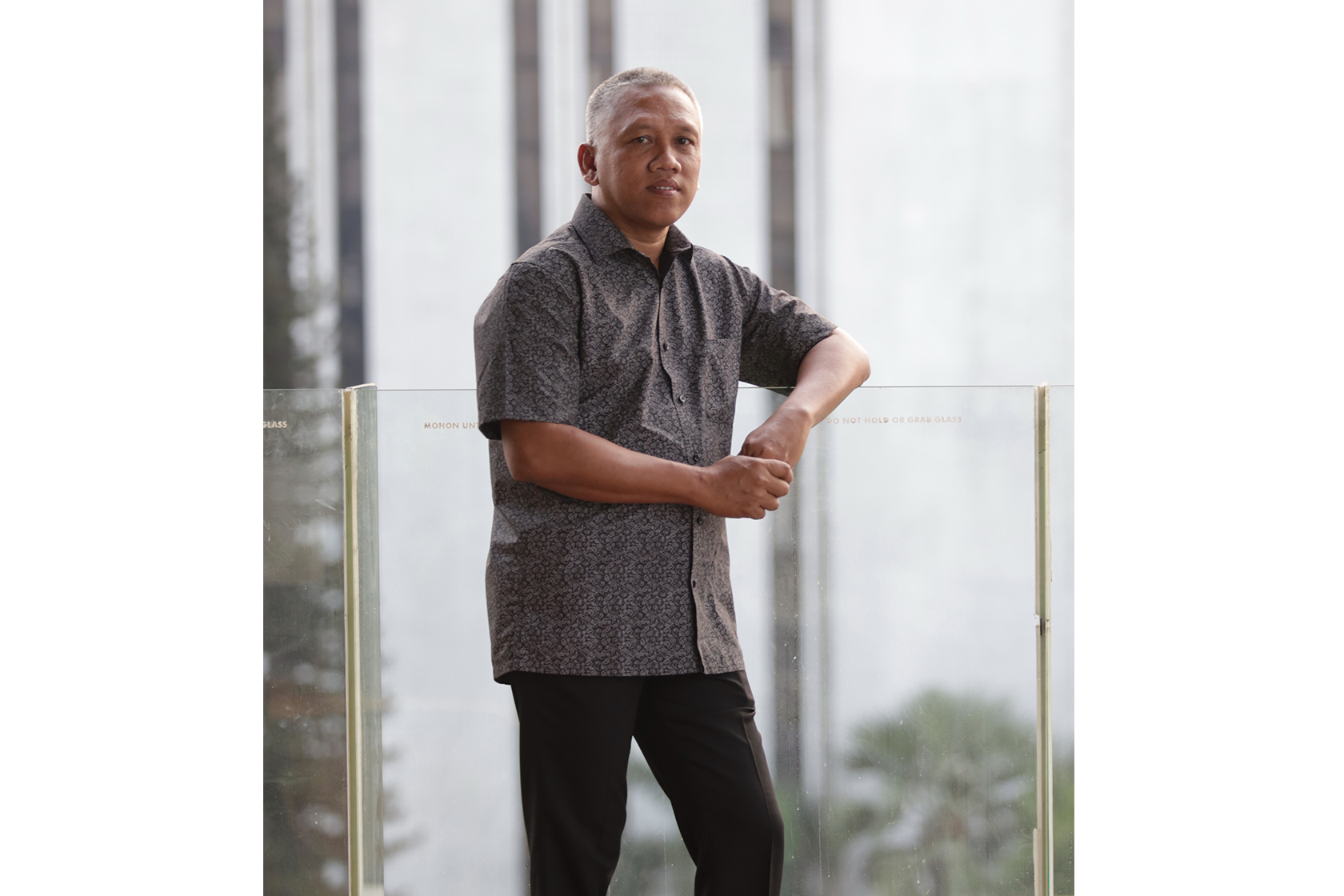Before the COVID-19 pandemic, deaf and hard-of-hearing people would often struggle to converse with hearing people. Then, for those who lip-read and observe facial expressions when interacting with others, the mandatory use of face masks made it even harder.
Due to a severe shortage of sign language interpreters throughout Indonesia, deaf people had limited access to information in all facets of their lives, including education, employment, health, legal support, and other public services.
The pandemic highlighted the pressing need for high-quality sign language interpreters, which Australia Awards alumnus Mohammad Ismail has advocated for years. And the timing couldn’t be better.
When the pandemic struck in early 2020, Ismail had recently started a project to increase the capacity and quality of sign language interpreters in Yogyakarta. The project is funded by the Australian Government through the Australian Alumni Grant Scheme.
Ismail, who is the media coordinator of Sigab (Sasana Inklusi & Gerakan Advokasi Difabel, or Disability Inclusion and Advocacy Centre), a non-government organisation that advocates for the inclusion of people with disabilities, explained how some deaf people read lips, use sign language, write notes, and various other things.
“Deaf and hard-of-hearing people have different communication and information needs,” said Ismail, who is also a deaf person. “Sign language interpreters are needed for deaf people who use sign language to interact with hearing people.”
When the project began in November 2019, there were only a handful of sign language interpreters in the Yogyakarta Deaf community. Some of them had insufficient training for the role and they lacked access to knowledge to improve their skills.
The project's main activity was a three-day capacity-building course for Sign Language Interpreters (SLI) in February 2020. The training provided 30 participants with the opportunity to enhance human resources for the management of sign language interpreter services.
In three online meetings following the training in February 2020, the participants learned about interpreting techniques, standard operating procedures for online interpreters, and management evaluations.
Sign Language Interpreters in Education
The idea of training for sign language interpreters emerged after Ismail met lecturers at Sunan Kalijaga State Islamic University (UIN Kalijaga). The university had held a sign language class to get volunteers to help deaf students to learn on campus. There were also difficulties in meeting requests for sign language interpreters for workshops.
“The available interpreters were still not at their maximum ability, whereas the campus wanted to learn more from the deaf community,” said Ismail. “Looking at these issues, as a deaf person, I wanted to develop their ecosystem and to create communication accessibility for deaf people, in a course which sign language interpreters and deaf people run,” Ismail said.
Advocating for Sign Language
Ismail learned sign language as an adult, after he graduated from the Bandung National Institute of Technology (Itenas Bandung). His parents had sent him to regular schools, not special education schools, where he learned to interact with hearing people by reading lips and other means. Ismail was eventually able to try a hearing aid as an adult.
“I wore a hearing aid when I was already in my adulthood, so I didn’t understand what people were saying even though I could hear the sound,” he said.
One day, Ismail saw his deaf nieces and nephews who went to special education schools and talked with each other using sign language. Their ease of communicating using sign language encouraged Ismail to learn, and over time, he became more comfortable using sign language for communication.
When Ismail became the chairman of the Indonesian Association for the Welfare of the Deaf (Gerkatin) branch in Solo in 2000, he launched a public campaign to raise awareness about the importance of sign language. In 2010, Gerkatin Solo held a sign language class every weekend during car-free day events, drawing enthusiasm from the public. President Joko Widodo, who was Solo’s mayor at the time, fully supported the activity.
“From this experience, I saw that people who can use sign language were interested in volunteering with Gerkatin Solo because they wanted to help deaf people have smooth interactions with society,” he said.
Deaf people can now ask volunteers who are fluent in sign language to help them in meetings with hearing people. The volunteers also formed the Deaf Volunteering Organisation in Solo, which was the first organisation in Indonesia that brought together sign language volunteers. The development in Solo has rippled out, with more sign language interpreter services emerging, including the Sign Language Service Centre, or Pusat Layanan Juru Bahasa Isyarat, in Jakarta.
Australia Awards Leadership Short Course
In January 2016, Ismail had the opportunity to improve his skills in leadership and project management when he participated in a two-week Australia Awards Short Course on Organisational Leadership and Management Practices for Disabled People’s Organisations funded by the Australian Government.
In the short course held at the University of Sydney, Ismail and other participants also learned about media advocacy and drafting proposals.
“The knowledge I gained from the short course helped us improve our organisation's capability. It also encouraged me to improve sign language interpreting services,” Ismail said.
In 2016, Ismail developed a sign language service application called Signteraktif, which allows the public to book sign language interpreters for their events. The application helps sign language interpreters bridge communication between deaf and hearing people.
During his stint in Australia, Ismail also witnessed how concession programs give people with disabilities free or subsidised access to public services, such as transportation and equipment, such as hearing loops or hearing aids.
Ismail hoped the Indonesian Government could speed up the process of passing a government regulation on the concession policy, providing financial subsidies for people with disabilities.
“Equipment that helps mobility and activity of people with disabilities is costly, for example, wheelchairs or hearing aids. The policy will ease their financial strain,” he said.
Pandemic Creates a Boom in Demand for Interpreters
In the past, volunteer sign language interpreters did not receive government support because their expertise could not be turned into a promising profession. Sign language interpreters took turns volunteering because they relied on their primary job to make ends meet. In many cases, volunteers left Yogyakarta and Solo for better-paying positions. Only a few sign language students could continue to pursue it.
However, during the pandemic, the Sign Language Service Centre in Jakarta or Pusat Layanan Juru Bicara Isyarat (PLJ), saw a jump in requests for sign language interpreters. In addition, local, national, and international organisations requested sign language interpreters for online events.
“PLJ was so overwhelmed with requests that they requested sign language interpreters from other cities, including Yogyakarta,” Ismail explained.
The Indonesian Sign Language Centre (Pusbisindo) in Yogyakarta also held online sign language classes to meet the rising demand for interpreters. In addition, Pusbisindo sped up training for those who had already learned sign language to become interpreters to meet the demand.
The jump in demand for sign language interpreters during the pandemic and continued growth since then has proven that sign language interpreting can become a professional occupation.
“The pandemic opened new job opportunities for sign language interpreters. Many volunteers with permanent jobs started to take sign language interpreting as a side job,” Ismail said.
To push for professional certification for sign language interpreters, Ismail and other deaf activists drafted the National Work Competency Standard (RSKKNI) for sign language interpreters. The Ministry of Manpower approved the SKKNI and passed the decree in December 2021.
In February 2022, an online seminar on opportunities to become a professional sign language interpreter attracted more than 200 participants. The event also aimed to speed up the establishment of a professional standards institution responsible for issuing certification of competency for professional sign language interpreters.
“We are aware that establishing such an institution will take a long time because there is no association for sign language interpreters,” Ismail said. “Therefore, we aim to continue to develop programs to recruit more sign language interpreters from the younger generation and to strengthen sign language interpreters’ organisations.”


 Mohammad Ismail Bridges Communication between Deaf and Hearing People through Sign Language Interpreters
Mohammad Ismail Bridges Communication between Deaf and Hearing People through Sign Language Interpreters
